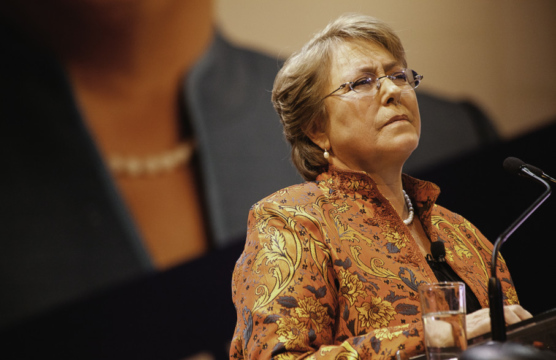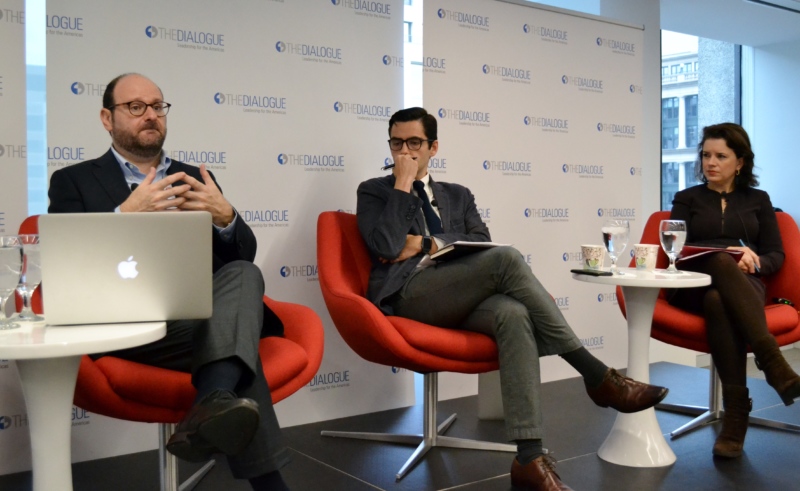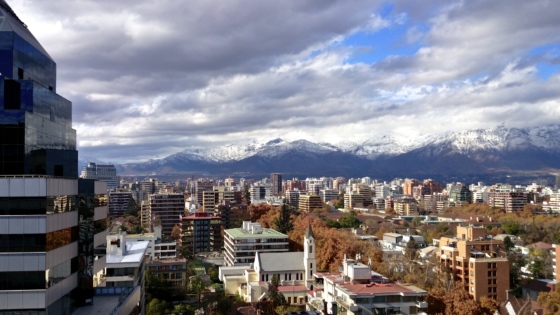
Bachelet’s Regional Challenges
Even before Michelle Bachelet began her second term she got a taste of the difficult regional climate she will have to deal with over the next four years.
On February 15, the Inter-American Dialogue hosted an event titled “Piñera’s Second Term” to discuss the implications and challenges of president-elect Piñera’s second term. This event was moderated by Michael Shifter with speakers Robert Funk (Universidad de Chile), Gabrielle Trebat (McLarty Associates), and Sergio Urzua (University of Maryland). The speakers discussed the social, political, and economic implications of Piñera’s victory and forthcoming challenges.
According to Funk, an important outcome of this election was that no one group could claim absolute victory. For one, Piñera’s Chile Vamos coalition did not win a majority in the legislative assembly. This will make it difficult for him to push forward substantial changes to President Bachelet’s reforms. Piñera has the option of working with the Christian Democrats or relying on executive orders. On the other hand, the Nueva Mayoría (successor of the Concertación) lost votes to the unexpected rise of the left-wing Frente Amplio. President Bachelet’s low popularity, internal party divisions, and weak candidates diminished the appeal of the continuation of the incumbent governing coalition. Funk attributed the traditional parties’ weakness to changes in the electoral system which allowed the entry of non-traditional parties. He also identified significant changes happening in the country’s political parties, its leadership, and demographics and economics.
“Foreign investors are cautiously optimistic that Piñera will be able to revisit Bachelet tax reforms, labor reforms, and the general dialogue with industry.” - Gabrielle Trebat of @McLartyAssoc #PiñeraRound2 pic.twitter.com/T2noBgEfry
— The Inter-American Dialogue (@The_Dialogue) February 15, 2018
Urzua commented on Chile’s economic conditions and its impact on the elections. Chile, he stated, runs the risk of falling into a middle-income trap. As a result, the middle class wanted to secure its progress and felt that Bachelet’s reforms failed to do so. Poor performance in recent years has been shown in weak copper trade, high corporate tax rates, and low foreign investments in the country. Economic inequality still remains a prominent issue, which Urzua believed Bachelet inadequately addressed in her education initiatives. Piñera is challenged with building an “open-access society, where opportunity is merit-based.” Overall, he will likely not embark on ambitious reforms, but small changes to improve macroeconomic conditions.
Trebat offered her perspective and insights from the investor community. She expressed that many financial investors are feeling cautious about the necessary changes that Piñera could bring. They have recognized that he will need to balance ongoing social pressures and economic competitiveness. Piñera’s biggest policy challenges are pension reform, health care affordability, and regulatory reform. Moreover, he will like demonstrate continuity in reinforcing Chile’s leadership in regional trade agreements such as the Trans-Pacific Partnership, the Pacific Alliance, or Mercosur. Trebat argued that he ultimately has the advantage of appearing as a pragmatic candidate which will permit him to pursue incremental changes.
Given the imminent change in leadership across the region, participants asked what we could expect from Chile’s foreign policy. The panelists believed that the incoming government’s initial focus will be regional. But the border dispute with Bolivia and Trump’s dismissal of a multilateral system may provide initial challenges.
The speakers identified the future viability of the traditional political parties/coalitions as the major political challenge. The changes which Funk identified are causing divisions not along the left-right spectrum, but along generational lines. The formerly strong coalitions of the left and right have relied on Bachelet and Piñera to win presidencies, with little innovation in future leadership. Urzua further added that there is a new generation of voters who did not live under the dictatorship. Consequently, the younger generation is questioning why the Pinochet-era setup of institutions continues to exist. If the parties do not actively respond to these frictions, then they may inevitably continue to lose ground to non-traditional parties.
Even before Michelle Bachelet began her second term she got a taste of the difficult regional climate she will have to deal with over the next four years.
Bachelet has started her term with an ambitious agenda that includes tax, education, and constitutional reforms.
El ex ministro está convencido de que el ex mandatario es la mejor carta de la Nueva Mayoría para enfrentar a la derecha en 2017 y encabezar un programa que rectifique las reformas, pese al desfavorable escenario político que reflejó la encuesta CE.
 Irene Estefanía González / Inter-American Dialogue
Irene Estefanía González / Inter-American Dialogue
